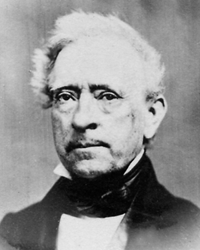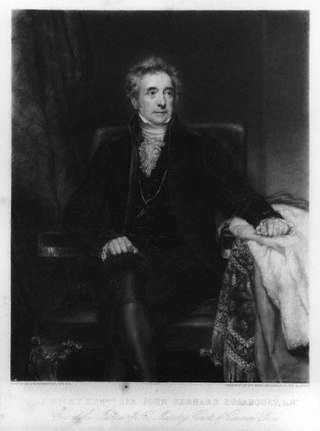Related Research Articles

Thomas Willing was an American merchant, politician and slave trader who served as mayor of Philadelphia and was a delegate from Pennsylvania to the Continental Congress. He also served as the first president of the Bank of North America and the First Bank of the United States. During his tenure there he became the richest man in America.

Dominic Bryce Hubbard, 6th Baron Addington, is a British Liberal Democrat politician, the president of the British Dyslexic Association and the vice-president of the UK Sports Association.
James Morris may refer to:

Carlos Coolidge was an American Whig politician, a lawyer, a Vermont state representative, the Speaker of the Vermont House, a state senator, and the 19th governor of Vermont.
The Panic of 1796–1797 was a series of downturns in credit markets in both Great Britain and the newly established United States in 1796 that led to broader commercial downturns. In the United States, problems first emerged when a land speculation bubble burst in 1796. The crisis deepened when the Bank of England suspended specie payments on February 25, 1797 under the Bank Restriction Act of 1797. The Bank's directors feared insolvency when English account holders, who were nervous about a possible French invasion, began withdrawing their deposits in sterling rather than bank notes. In combination with the unfolding collapse of the U.S. real estate market's speculative bubble, the Bank of England's action had deflationary repercussions in the financial and commercial markets of the coastal United States and the Caribbean at the start of the 19th century.
The Panic of 1847 was a major British commercial and banking crisis, possibly triggered by the announcement in early March 1847 of government borrowing to pay for relief to combat the Great Famine in Ireland. It is also associated with the end of the 1840s railway industry boom and the failure of many non-bank lenders. The crisis was composed of two phases, one in April 1847 and one in October 1847, which was more serious and known as 'The Week of Terror'.

Sir John Bernard Bosanquet KS PC was a British judge.

Levi Woodbury was an American attorney, jurist, and Democratic politician from New Hampshire. During a four-decade career in public office, Woodbury served as Associate Justice of the Supreme Court of the United States, a United States Senator, the ninth governor of New Hampshire, and cabinet member in the Andrew Jackson and Martin Van Buren administrations. He was promoted as a candidate for the Democratic nomination for President of the United States in 1848.

Sir John Henry Pelly, 1st Baronet, DL was an English businessman. During most of his career, he was an employee of the Hudson's Bay Company (HBC), serving as Governor of the HBC for three decades. He held other noteworthy offices, including Governor of the Bank of England. The title of Baronet Pelly was created for him.

Elisha Harris of Coventry, Kent County, Rhode Island, was Lieutenant Governor of Rhode Island, 1846–47 serving under Governor Byron Diman and the 20th Governor of Rhode Island 1847–49.
Sir John Rae Reid, 2nd Baronet (1791–1867) was a Scottish merchant and financier. He was a Tory and Conservative politician who sat in the House of Commons between 1830 and 1847.
Edward Payne was Governor of the Bank of England from 1771 to 1773. He had been Deputy Governor from 1769 to 1771. He replaced William Cooper as Governor and was succeeded by James Sperling. Payne's tenure as Governor occurred during the Bengal bubble crash (1757–1769) and the Crisis of 1772.
James Sperling was Governor of the Bank of England from 1773 to 1775. He had been Deputy Governor from 1771 to 1773. He replaced Edward Payne as Governor and was succeeded by Samuel Beachcroft. Sperling's tenure as Governor occurred during the Bengal bubble crash (1769–1784).
James Pattison was Governor of the Bank of England from 1834 to 1837. He had been Deputy Governor from 1833 to 1834. He replaced Richard Mee Raikes as Governor and was succeeded by Timothy Abraham Curtis.
Timothy Abraham Curtis was Governor of the Bank of England from 1837 to 1839. He had been Deputy Governor from 1834 to 1837. He replaced James Pattison as Governor and was succeeded by John Reid. Curtis' tenure as Governor occurred during the Panic of 1837. In June 2020, the Bank of England issued a public apology for the involvement of Curtis, amongst other employees, in the slave trade following the investigation by the Centre for the Study of the Legacies of British Slave-ownership at UCL.
John Benjamin Heath FRS FSA was Governor of the Bank of England from 1845 to 1847.
William Robinson was Governor of the Bank of England from April to August 1847. He had been Deputy Governor from 1845 to 1847. He replaced John Benjamin Heath as Governor and was succeeded by James Morris. Robinson's tenure as Governor occurred during the Panic of 1847.
Henry James Prescott was Governor of the Bank of England from 1849 to 1851. He had been Deputy Governor from 1847 to 1849. He replaced James Morris as Governor and was succeeded by Thomson Hankey.
Sir Augustus Prevost, 1st Baronet was Governor of the Bank of England from 1901 to 1903.
References
- ↑ Governors of the Bank of England. Archived 12 February 2012 at the Wayback Machine Bank of England, London, 2013. Archived here. Retrieved 22 March 2016.